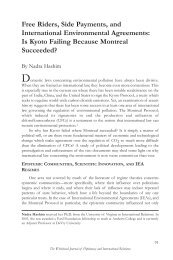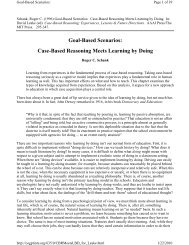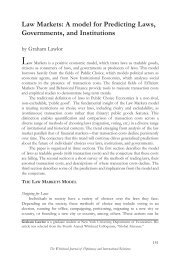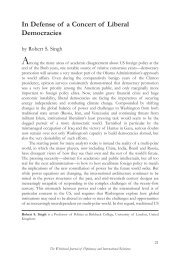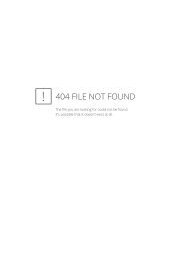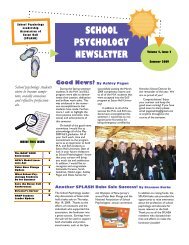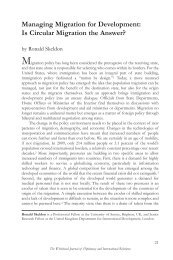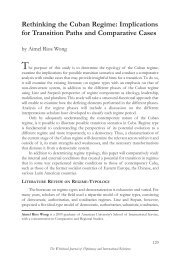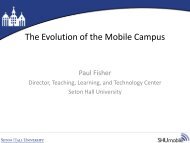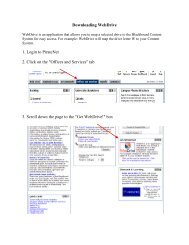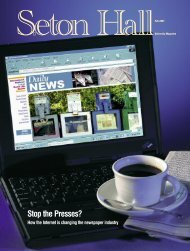Seton Hall Magazine, Winter 2000 - Seton Hall University
Seton Hall Magazine, Winter 2000 - Seton Hall University
Seton Hall Magazine, Winter 2000 - Seton Hall University
Create successful ePaper yourself
Turn your PDF publications into a flip-book with our unique Google optimized e-Paper software.
M e d i a<br />
No More Paper, No More Printers, No More Presses<br />
BY AGNES HOOPER GOTTLIEB ’75, PH.D.<br />
Imagine the dilemma of the<br />
poor journalism professor in<br />
1899 who was asked to make<br />
a few predictions of what the<br />
media would be like in the<br />
20th century. What a century<br />
it was!<br />
We saw the development<br />
of radio as a viable communication<br />
network, the<br />
invention of television and<br />
its ultimate conquest as the<br />
dominant medium; and in the<br />
final years of the final decade,<br />
we saw a new medium — the<br />
Internet — make an impact that none of<br />
us could possibly have anticipated.<br />
That poor journalism professor<br />
obviously got it all wrong. There’s no<br />
way that anyone but a science fiction<br />
writer with the wildest of imaginations<br />
could have predicted our reliance on<br />
and the pervasiveness of media in<br />
our lives today.<br />
Now, don’t you feel sorry for me?<br />
I’ve been asked to forecast the future<br />
of media, and there’s a better than even<br />
chance that I’m going to get it all wrong.<br />
But here goes: Imagine all your<br />
communication needs — news, entertainment,<br />
message retrieval and mail —<br />
delivered to you instantly on an 8-by-<br />
11-inch, thin notebook-like, lightweight<br />
plastic screen. That’s my prediction<br />
for the future — and, as I gaze into my<br />
crystal ball, I also predict that it’s going<br />
to happen in our lifetimes.<br />
We are living on the edge of the second<br />
universal communication revolution.<br />
The first began with Johannes<br />
Gutenberg in the 15th century when he<br />
created a feasible method of moveable<br />
type that ultimately unleashed countless<br />
ideas and heresies on the world.<br />
For half the millennium, the printed<br />
word was the only way to communicate;<br />
now, perish the thought, it’s the only<br />
outdated way.<br />
14 SETON HALL UNIVERSITY MAGAZINE<br />
Newspapers<br />
are dinosaurs — even the<br />
assignment editors on major dailies<br />
concede that, but it took millions of<br />
years to kill the dinosaurs off, and<br />
newspapers aren’t going to disappear<br />
without a fight. There’s no question but<br />
that newspapers as we know them<br />
today will be extinct by the end of the<br />
21st century. But those of you who relish<br />
your newspaper with your morning coffee<br />
need not despair. They will be<br />
replaced by technology that is equally<br />
accommodating and comforting.<br />
Changes are already in progress. Let’s<br />
face it: We all realized nearly 40 years<br />
ago when President John F. Kennedy<br />
was shot, and the nation sat glued to<br />
their televisions, that newspapers<br />
couldn’t compete with the immediacy<br />
of that medium. Now, the challenge is<br />
even greater. Newspapers have established<br />
a presence on the World Wide<br />
Web, but don’t really know where to go<br />
from here. We’ve been told that the<br />
Web is the perfect venue for classified<br />
ads, long the backbone of newspaper<br />
revenues, and newspapers are scrambling<br />
to make sure they don’t lose this<br />
source of income.<br />
Visionary think tankers, paid big<br />
bucks to sit in ivory towers and imagine<br />
the future, predict the paperless<br />
newspaper — a plastic notebook-size<br />
tablet, perhaps — that delivers customtailored<br />
news to subscribers. No more<br />
paper, no more deliverers, no more<br />
printers, no more presses. Press a<br />
button, up comes your stock<br />
quotes; another button<br />
delivers sports.<br />
They’ve got to be<br />
kidding me. What will<br />
I read with my morning<br />
coffee? What are we to<br />
wrap our potato peels in?<br />
Will papier-mâché disappear?<br />
Stay tuned for the next century.<br />
And what do they say about television?<br />
Surely the satellite dishes that<br />
still conjure up images of flying saucers<br />
and brave new worlds will become less<br />
obvious and more compact. You’ll be<br />
able to watch whatever you want (the<br />
latest films, the most up-to-date news)<br />
on that same tablet you carry your newspaper<br />
on. Want to read a book? Buy it<br />
from your subscription service and read<br />
it online. Or better yet, let your tablet<br />
read it to you.<br />
Twenty years ago, only a few people<br />
had answering machines and most of us<br />
were put off by them. Now, we’re<br />
annoyed at the arcane few who don’t<br />
have that technology. Take that a step<br />
further — our children will leave video<br />
messages that we’ll play off that little<br />
plastic box our newspaper showed up on<br />
this morning.<br />
Sure, laptop computers are a step<br />
toward that, but until they eliminate the<br />
keyboard and make the computers<br />
respond correctly to our voice commands<br />
(and already they’re starting to do that),<br />
the future is still that. And those laptops<br />
just don’t make it when you want to<br />
wrap up a fish!<br />
Whatever the outcome, it’s going to<br />
be great to be part of the future! Enjoy<br />
the ride.<br />
Agnes Hooper Gottlieb ’75,<br />
Ph.D., is an associate professor<br />
of communication in the College<br />
of Arts and Sciences and director<br />
of the Elizabeth Ann <strong>Seton</strong><br />
Center for Women’s Studies.<br />
STEININGER OTTO/SPOTS ON THE SPOT




